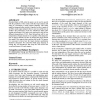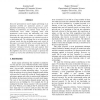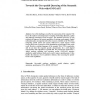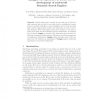SAC
2005
ACM
14 years 5 months ago
2005
ACM
Current search engines crawl the Web, download content, and digest this content locally. For multimedia content, this involves considerable volumes of data. Furthermore, this proc...
WISE
2005
Springer
14 years 5 months ago
2005
Springer
Result merging is a key component in a metasearch engine. Once the results from various search engines are collected, the metasearch system merges them into a single ranked list. T...
SIGIR
2006
ACM
14 years 6 months ago
2006
ACM
Structural hints in XML-retrieval queries can be used to specify both the granularity of the search result (the target element) and where in a document to search (support elements...
ACMICEC
2006
ACM
14 years 6 months ago
2006
ACM
In this paper we have introduced a methodology to rank the available products in the Internet market. These rankings are based on the customers’ own preferences and also on the ...
SAINT
2006
IEEE
14 years 6 months ago
2006
IEEE
This paper focuses on decentralized personalized search engines. It is composed of three parts. Firstly, we formulate the problem and we propose a graph-based measure of quality o...
ICDM
2006
IEEE
14 years 6 months ago
2006
IEEE
Keyword3 generation for search engine advertising is an important problem for sponsored search or paidplacement advertising. A recent strategy in this area is bidding on nonobviou...
W2GIS
2007
Springer
14 years 6 months ago
2007
Springer
One of the challenges raised by the construction of the semantic Web lies in the analysis and management of complex relationships (thematic, spatial and temporal) connecting severa...
MCAM
2007
Springer
14 years 6 months ago
2007
Springer
Existing Web image search engines index images by textual descriptions including filename, image caption, surrounding text, etc. However, the textual description available on the W...
ICWE
2007
Springer
14 years 6 months ago
2007
Springer
Abstract. Search engines are becoming such an easy way to find textual resources that we wish to use them also for multimedia content; however, syntactic techniques, even if promi...
CIKM
2007
Springer
14 years 6 months ago
2007
Springer
Web search engines consistently collect information about users interaction with the system: they record the query they issued, the URL of presented and selected documents along w...




